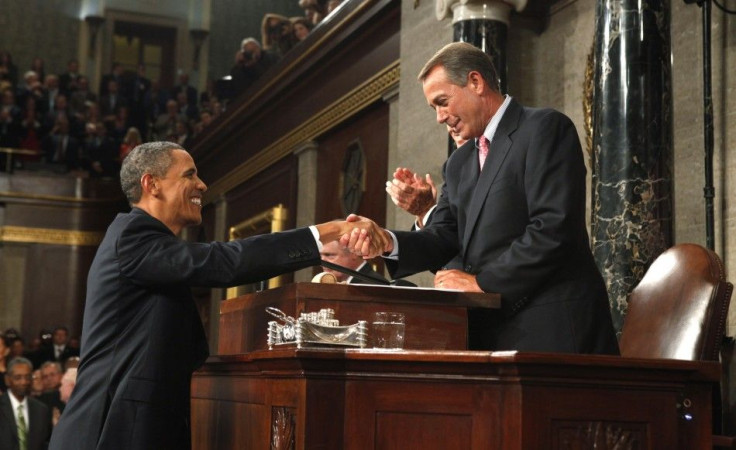Obama's 'Buffett Rule' Proposal Has Merit
ANALYSIS

Republicans are saying President Barack Obama's unveiling of a $3 trillion long-term deficit reduction plan -- dubbed the Buffett Rule -- that relies upon raising taxes on the wealthiest Americans is political posturing and window-dressing.
And they're right.
Obama's proposal unveiled on Monday from the White House Rose Garden is just that -- political posturing and window-dressing.
Because the proposal doesn't stand much of a chance at getting past Congress, particularly in light of the Republican-controlled House, the accusations have merit. But that doesn't mean Obama isn't on the right track. That doesn't mean that Obama's plan is wrong.
Just because Obama knows it likely won't pass Congress doesn't mean he shouldn't put his best foot forward, with posturing and window-dressing if that's what's required.
At the moment, America needs some sensible political posturing -- not the kind of nonsensical talk that doesn't hold potential for powerful results as many Republicans have been peddling in recent months. And on this one, Obama's Buffett Rule, named for legendary investor Warren Buffett who has said wealthy Americans need to pay more taxes, is on the proverbial money.
This is not class warfare -- it's math, Obama said Monday, unveiling his proposal to cut the deficit.
It's not like Obama's plan relies solely on applying more reasonable tax code rules to America's wealthy individuals who typically don't pay much in the way of earned wage taxes, either. His plan also includes roughly $580 billion in cuts to mandatory benefit programs, including Medicare -- something many Republicans have repeatedly called for.
It also relies on withdrawing American troops from Iraq and Afghanistan, something that must be accomplished so that the nation isn't in a perpetual state of war, risking precious lives and dollars.
There's no denying that a bulk of Obama's deficit reduction plan comes from a proposed $1.5 trillion in new taxes, however. That's what many Republicans don't want. That's what many Republicans are crying about. And that's where this problem begins.
The general premise behind Obama's proposal is making the small percentage of Americans who make $1 million or more per year pay the same overall rate as other taxpayers. Sure, higher income brackets are already taxed at a high rate -- but that rate is based upon earned wages.
Most of the highest income Americans are like Buffett -- they get tax breaks on the majority of their income because it doesn't fall into the earned wage bracket. Consider only that most wealthy Americans make money each year from returns on investments, and investment income is taxed at 15 percent.
Meanwhile, middle-income Americans are effectively footing an unreasonable percentage of the nation's budget.
Anybody can do that math, and it doesn't add up. Buffett doesn't think so. And he's shown over the years that he can do some math.
So while Republicans say Obama is politically posturing with a window dressing proposal they are right. Obama undoubtedly knows he can't get the proposal, as is, through Congress. But he also knows that the vast majority of Americans are getting the short end of the stick when it comes to tax-paying.
If he can get the nation to wake up and realize that, as Buffett says, wealthy Americans aren't paying their fair share, the posturing and window dressing could ultimately pay dividends. This country has a $14.5 trillion deficit and most middle-income Americans are taxed beyond what they can afford.
Meanwhile, the wealthiest Americans end up paying far less by the time their returns are finished. And that's a problem.
Wealthy Americans shouldn't pay more than working class Americans in taxes. But they should certainly pay as much. And, if it takes posturing and window dressing to get that point across, then Obama is on the right track.
© Copyright IBTimes 2024. All rights reserved.





















